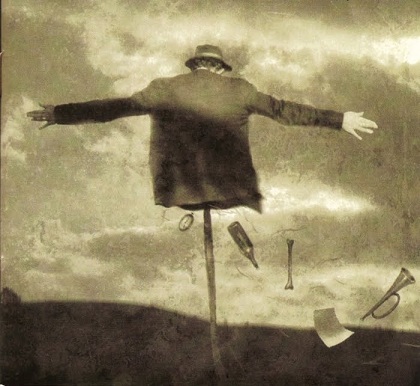(Planet of Sound is a bi-weekly speculative-fiction music feature.)
Tom Waits is one of music’s preeminent storytellers, and the stories he tells fit the voice he tells them in: whiskey-soaked, growling, broken-down, and sinister. Waits has been rasping out tales of the desperate and the damned since the early 70s, and as he’s aged, he’s done the opposite of mellow—he’s gotten even darker and more dramatic.
An admission: when I first heard Waits’ voice, in high school, I boggled that anyone could even listen to it, let alone love it. It seemed both abrasive and jokey; I thought he had to be trolling, seeing what sort of ridiculousness he could get away with passing off as “singing.” But over time, I’ve come around. For the right songs, that voice fits like nothing else.
“Black Wings,” the bleakly cinematic tale of a Stranger Come to Town, is one of the songs that voice is made for.
The song is from Bone Machine, Waits’ 1992 album, which somehow managed to win a Grammy award despite being his darkest to that point. Recorded in a nearly bare cement room, with Les Claypool of Primus supposedly playing human bones on the intro track [via] , Bone Machine‘s songs come in different styles (blues, rock, country, folk, all filtered through Waits’ theatrical voice and vision), but the overall sentiment is of gleefully anarchic gloom.
Nestled in among songs about death, murder (a type of death), and apocalypse (a really big death), “Black Wings” sets the horror to simmer rather than splatter, but it’s still satisfyingly creepy.
When the moon is a cold chiseled dagger
and it’s sharp enough to draw blood from a stone,
he rides through your dreams on a coach and horses,
and the fence posts in the moonlight
look like bones.
Talk about atmospheric—and talk about atmosphere music can provide that prose cannot. “The fence posts looked like bones” is the sort of horror metaphor that has been completely hobbled by overuse (like, say, “the branches looked like grasping fingers”). But in a musical context, with the menacing way Waits enunciates “bones,” it works. I bet that metaphor was absolutely killer the first time someone used it in prose—and it sounds like the first time, here.
Into this ominous atmosphere, spaghetti-western guitar swirling behind, strides the nameless subject of the song.
Well they stopped trying to hold him
With mortar, stone and chain
He broke out of every prison
The character Waits creates here is individual but archetypical—the details are unique, but the larger form is universal. I see very obvious parallels in the Stephen King characters Randall Flagg (“The Walkin’ Dude”) from The Stand and the Man in Black from the Dark Tower series. These are mysterious men or more than men, of (initially) uncertain power or motivation, who are always on the move, leaving everything unbalanced and off-kilter in their wake.
There is, however, an ambiguity to this character’s ultimate goals. He doesn’t just kill men with guitar strings, he also saves babies, and if “some say they fear him,” still “others admire him.” It’s interesting the way the song’s title affects our perception of the character; if those rumored wings are black, it’s villains who come to mind as parallels, rather than someone like Clint Eastwood as the Man With No Name. But the line in the song does not specify the color or type of wings. Feathered-angel and leathery-devil are both possible. (Membranous-insect seem unlikely.)
Or there might be nothing supernatural at all. When Waits sings “he can turn himself into a stranger,” that’s a far cry from saying the man can turn himself into a bat or other animal. Anything truly fantastical about this character is merely rumored—most especially those wings. And the rumors seem likely to stay unconfirmed, with no eyewitness reports: “one look in his eye, everyone denies ever having met him.” Which fact, of course, brings us right back around to the possibly-supernatural again.
 The Stranger archetype Waits is playing with here feels easy to recognize, even if it’s hard to define exactly. The rumors, the mystery, the fear, the incredible deeds, and the lack of a name to pin on it all, all add up to a character who embodies the second half of the adage “there are only two stories in the world: a man goes on a journey, and a stranger comes to town.”
The Stranger archetype Waits is playing with here feels easy to recognize, even if it’s hard to define exactly. The rumors, the mystery, the fear, the incredible deeds, and the lack of a name to pin on it all, all add up to a character who embodies the second half of the adage “there are only two stories in the world: a man goes on a journey, and a stranger comes to town.”
Now I just want someone to explain why I can’t find a TV Tropes entry about this, with five hundred other examples of nameless strangers in long flappy coats.
Joshua Starr is a fan of speculative fiction in all media. ALL MEDIA.









